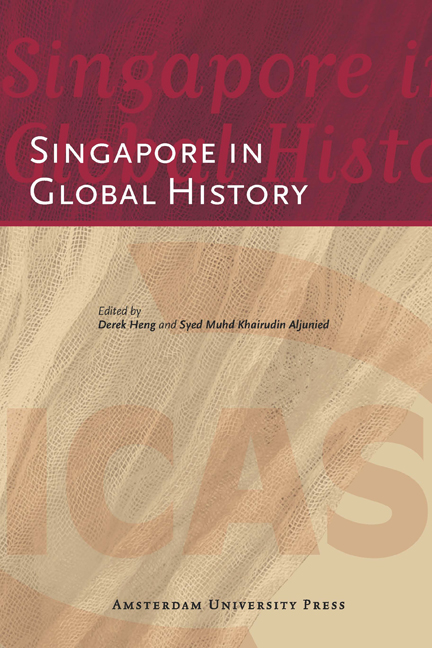Book contents
- Frontmatter
- Contents
- List of Tables and Illustrations
- Foreword
- 1 Globalising the History of Singapore
- 2 Situating Temasik within the Larger Regional Context: Maritime Asia and Malay State Formation in the Pre-Modern Era
- 3 The Singapore River/Port in a Global Context
- 4 ‘Walls of Illusion’: Information Generation in Colonial Singapore and the Reporting of the Mahdi-Rebellion in Sudan, 1887-1890
- 5 The Littoral and the Literary: Making Moral Communities in the Straits Settlements and the Gold Coast in the late Nineteenth and Early Twentieth Century
- 6 Social Discourse and Economic Functions: The Singapore Chinese in Japan’s Southward Expansion between 1914 and 1941
- 7 The Dynamics of Trans-Regional Business and National Politics: The Impact of Events in China on Fujian-Singapore Tea Trading Networks, 1920-1960
- 8 Rambutans in the Picture: Han Wai Toon and the Articulation of Space by the Overseas Chinese in Singapore
- 9 The Global Effects of an Ethnic Riot: Singapore, 1950-1954
- 10 The British Military Withdrawal from Singapore and the Anatomy of a Catalyst
- 11 Bringing the International and Transnational back in: Singapore, Decolonisation, and the Cold War
- 12 The Global and the Regional in Lee Kuan Yew’s Strategic Thought: The Early Cold War Years
- 13 A Brief History of the Hub: Navigating between ‘Global’ and ‘Asian’ in Singapore’s Knowledge Economy Discourse
- About the Contributors
- Bibliography
- Miscellaneous Endmatter
9 - The Global Effects of an Ethnic Riot: Singapore, 1950-1954
Published online by Cambridge University Press: 02 February 2021
- Frontmatter
- Contents
- List of Tables and Illustrations
- Foreword
- 1 Globalising the History of Singapore
- 2 Situating Temasik within the Larger Regional Context: Maritime Asia and Malay State Formation in the Pre-Modern Era
- 3 The Singapore River/Port in a Global Context
- 4 ‘Walls of Illusion’: Information Generation in Colonial Singapore and the Reporting of the Mahdi-Rebellion in Sudan, 1887-1890
- 5 The Littoral and the Literary: Making Moral Communities in the Straits Settlements and the Gold Coast in the late Nineteenth and Early Twentieth Century
- 6 Social Discourse and Economic Functions: The Singapore Chinese in Japan’s Southward Expansion between 1914 and 1941
- 7 The Dynamics of Trans-Regional Business and National Politics: The Impact of Events in China on Fujian-Singapore Tea Trading Networks, 1920-1960
- 8 Rambutans in the Picture: Han Wai Toon and the Articulation of Space by the Overseas Chinese in Singapore
- 9 The Global Effects of an Ethnic Riot: Singapore, 1950-1954
- 10 The British Military Withdrawal from Singapore and the Anatomy of a Catalyst
- 11 Bringing the International and Transnational back in: Singapore, Decolonisation, and the Cold War
- 12 The Global and the Regional in Lee Kuan Yew’s Strategic Thought: The Early Cold War Years
- 13 A Brief History of the Hub: Navigating between ‘Global’ and ‘Asian’ in Singapore’s Knowledge Economy Discourse
- About the Contributors
- Bibliography
- Miscellaneous Endmatter
Summary
Introduction
One of the major advances in scholarly writings about Southeast Asia in the past few decades has taken place in the study of ethnic riots (under the rubric of nation-state formation). From this perspective, episodes of mass violence involving two or more distinct ethnic groups are said to have been caused primarily by the ideological, structural, psychological, economic and social strains faced by local communities in their struggles to preserve their cultural traditions and civil rights amidst regime transitions and rapid political change. While acknowledging the interplay of regional and global processes as precipitants of ethnic riots, scholars subscribing to such a paradigm have tended to give primacy to the roles of endogenous forces in the perpetuation of conflicts that were already brewing in Southeast Asian societies.
Despite being extensive and no less impactful, one visible shortcoming of this prevailing strand of scholarship has been a strong emphasis on searching for causes and motives, much to the neglect of the larger implications and effects of ethnic riots. The aftermath of ethnic riots is rarely if ever discussed, let alone examined systematically, but such studies are mainly concerned with post-conflict reconstruction, including localised attempts at reconciling feuding groups, state restoration of ravaged societies and the implementation of preventive measures through the recommendations made by truth commissions. The picture that emerges from all of such studies of the aftermath of ethnic riots is that such conflicts have had little impact beyond their restricted settings. Put differently, the study of the aftermath of ethnic riots in Southeast Asia has been provincialised, relegated to a localised world, and thus excluded from the wider connections and developments in the region and beyond.
This essay takes a different approach. It seeks to provide an illustrative example of the ways in which the study of ethnic riots and – by implication, Singapore's past – could be reframed by initiating a shift away from the analysis of the causes, processes and conditions that led to the outbreak of mass violence towards the regional and global responses encountered and the attendant effects in the aftermath. At the centre of my analysis is the case of an ethnic riot that broke out in colonial Singapore, more commonly known as the Maria Hertogh riots.
- Type
- Chapter
- Information
- Singapore in Global History , pp. 173 - 194Publisher: Amsterdam University PressPrint publication year: 2012



